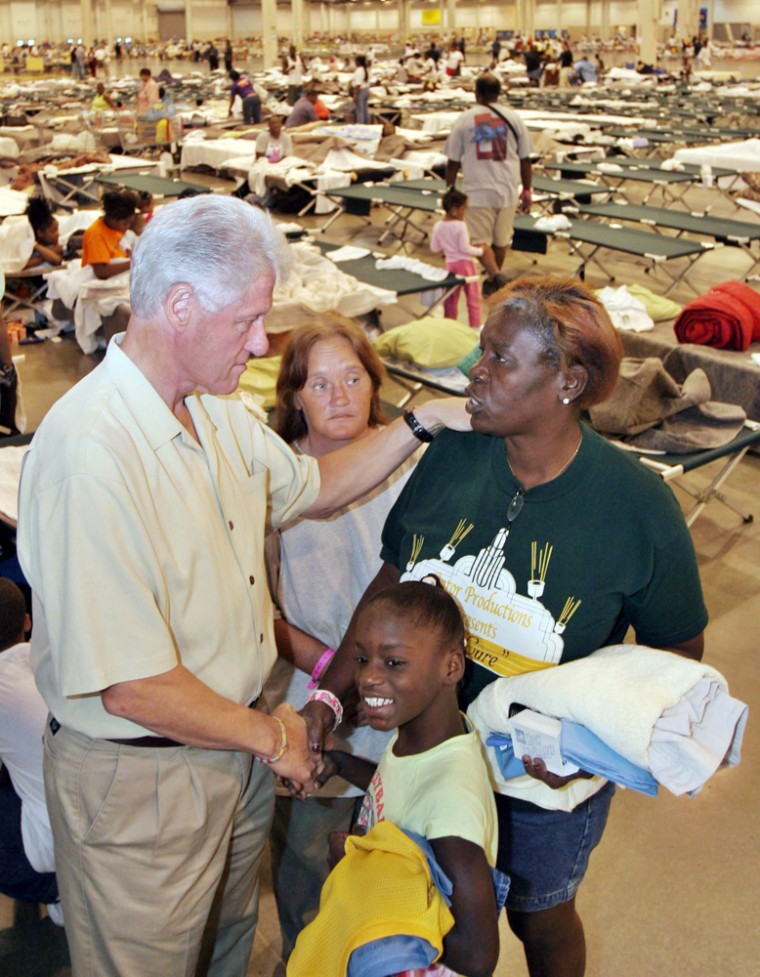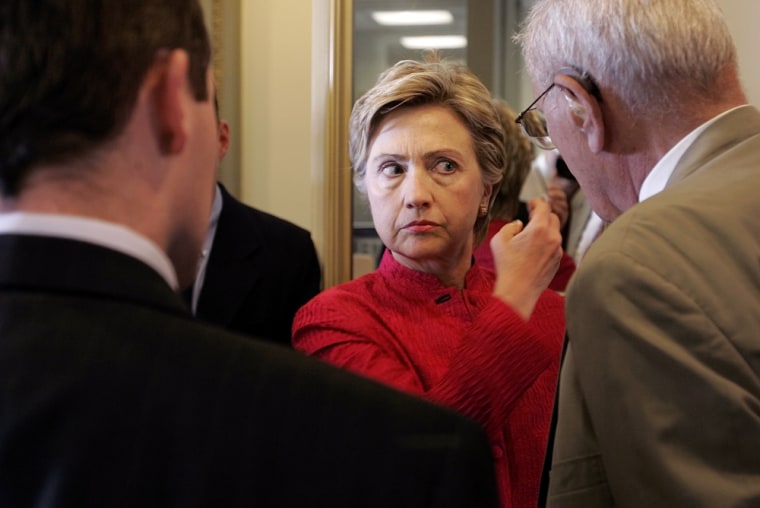Hillary Clinton was on the line and out for blood. Ever since she was elected in 2000, and especially since 9/11, the junior senator from New York has been careful not to move too quickly onto the national political stage (which she knows she can dominate any time she wants to). Instead, she has diligently — and shrewdly — stuck to the discrete concerns of the Empire State, preferring to worry aloud about, say, Buffalo, rather than Baghdad. But Hurricane Katrina has thrown Hillary's caution to the wind: she's decided to made a federal case out of this one.
What Sen. Clinton said to reporters in the conference call I just listened to — that FEMA should be separated from the Department of Homeland Security; that we need a 9/11-style investigative commission — is less interesting than why she said it, and why she said it now.
The answers go beyond the obvious fact that President Bush is in an enfeebled state, entering the sixth year of his presidency hobbled by suspicously skyrocketing gasoline prices and the Mesopotamian Morass.
Hillary, always the didactic one, thinks she has a deeper point to offer — and with it, a rationale of her pending run for the White House in 2008. And that rationale is: we Clintons know all about the proper, humane use of national government, and these (Bush) conservatives don't.
Attached to that is a more personal point: Yes, my husband was no saint, but it's okay to talk about him now because everyone agrees that he and his administration handled disaster relief well.
Big Government ... sometimes
Bill Clinton rose to power by mastering the art of swimming against a rising conservative tide, which reached its first crest in the Reagan '80s, when Clinton was governor of Arkansas. He eschewed Big Government answers to problems, welfare chief among them.

As president he was equally cautious, especially after Bob Rubin convinced him that Wall Street wasn't eager to underwrite anything more grand. Clinton kept his distance from his own wife's healthcare plan, and didn't seem all that steamed when it fizzled. He triangulated his way to reelection in 1996 on small cultural gestures.
But FEMA and disaster relief were relatively risk-free ways for Clinton to honor the Democratic Party's Big Government tradition. Even churlish conservatives would have to acknowledge not just the legitimacy, but the wisdom of a large federal role in planning for and cleaning up after natural disasters.
Clinton picked as FEMA chief James Lee Witt, a fellow Arkansan known for skill, experience and effectiveness in what had been considered a political backwater. As Empathizer-in-Chief, Clinton would need someone who could deliver the goods, and Witt knew how.
In his own comments, the former president was fairly cautious. After all, he and former President Bush have teamed up for another fund-raising drive. Still, he was blunter than usual in a prelude to what his wife would say the next day.
In the Gulf States, he said, "our government failed those people in the beginning, and I take it now that there is no dispute about it; 100 percent of the people recognized that it was a failure.... I have my own ideas about what caused it," he added — but left it up to his wife to explain them.
The next day Hillary arrived to tout this legacy. In "eight years of the Clinton Administration," she said, "qualified" officials ran FEMA. "During the Clinton Administration," she said, "the government took the lead in handling disasters of significance." And "that is as it should be," she said, since the federal government — and the national economy and American consumers-would ultimately have to pay the bill for the disaster in any case.
"FEMA had gotten very high marks" during her husband's tenure, she said. "There was a lot of good work done in eight years."
She wasn't finished. The Bush Administration's emphasis on the role of state and local governments and private charities "is a recipe for disaster," she said. "There was nobody in charge at the federal government level and no one willing to take responsibility to work with state and local governments."
Katrina exposed the weakness of planning for another terrorist attack, she said. "There is no plan, no overall strategy. We don't have a seamless, smooth-running response machine."
But now Hillary does.
